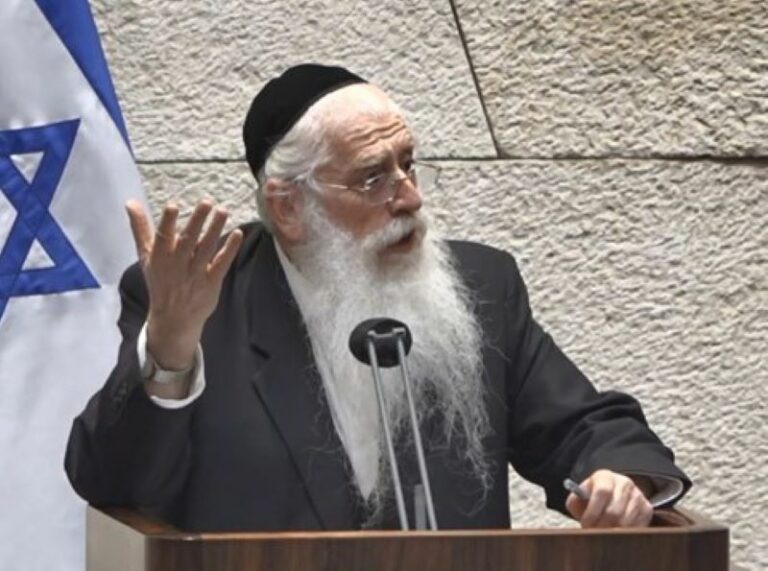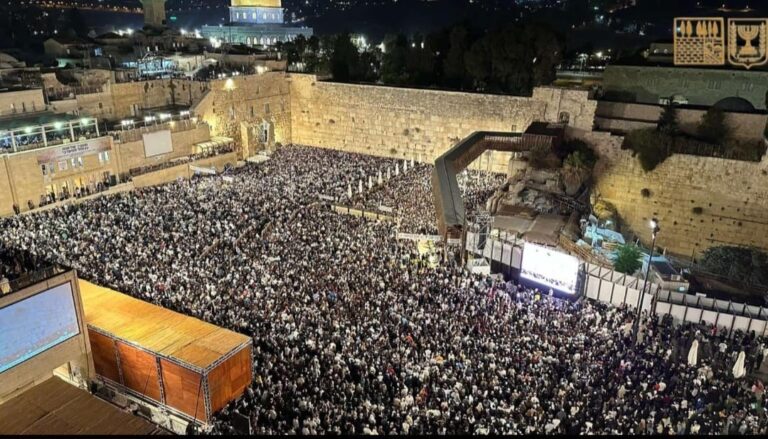Ish o isha ki yaflee lindor neder nazir l’hazir l’Hashem (6:2)
A nazir is a person who accepts upon himself three prohibitions: not to cut his hair, not to consume wine or grape products, and not to come into contact with the dead. While these seem like relatively minor restrictions, Rav Yehuda Zev Segal, the Manchester Rosh Yeshiva, notes that we find spectacular and lofty concepts associated with the nazir. The word “Nazir” itself is derived from the root “Nezer” – crown. What is the connection between a person who takes a Nazirite vow and a crown?
Further, one of the restrictions upon a nazir is the prohibition against contact with the dead. The Ba’al HaTurim explains that this is because the nazir may merit Ruach HaKodesh (Divine Inspiration), and people may attribute his newfound ability to impure and forbidden sources such as the dead. Why should a person who refrains from these three activities suddenly merit Divine Inspiration?
Rav Segal suggests that the answer lies in the words of the Ibn Ezra, who posits that the word connoting the nazir’s separation from these activities (“yaflee”) is rooted in the word “pela” – wonder – because the nazir’s actions are considered peculiar in the eyes of others. Most people are accustomed to innately following their earthly desires without a second thought about keeping them in check. The idea of a person voluntarily relinquishing physical pleasure runs counter to societal norms and is indeed a wonder. Through the nazir’s willingness to defy societal pressures and take action to curb his desires, he becomes a king over them and earns a spiritual crown, to the point that he may even merit Divine Inspiration!
Still, the Darkei Mussar questions why the nazir should earn these tremendous and lofty rewards for such an objectively minor action. He explains that while human nature is to evaluate actions quantitatively and to assume that larger deeds are superior, in Heaven actions are judged by their qualitative purity. Although the nazir remains in the physical world and accepts only three “minor” prohibitions on himself, if he does so purely for the sake of Heaven, he may receive Divine Inspiration.
The Darkei Mussar notes that although Avrohom was known for his frequent hospitality to guests, the Torah records only one such incident in detail (Bereishis 18) while merely hinting to the other episodes through a reference (Bereishis 21:33) to his planting an “Aishel” (which is an abbreviation for eating, drinking, and escorting). He suggests that while the other episodes may have been done publicly, the encounter with the angels disguised as Arab travelers on a hot day was done privately and revealed a purity of spirit not clearly evident from the other incidents.
This lesson is taught again at the end of the parsha. The Gemora is replete with laws derived from seemingly superfluous words in the Torah, based on the principle that the Torah doesn’t contain even a single unnecessary letter. It is therefore difficult to understand why the Torah repeats at excruciating length the offerings brought by each of the 12 tribal leaders when they were all identical to one another. It would have been much more concise to list the offering brought on the first day and to add that each subsequent leader brought the same offering on the succeeding days.
Rav Dovid Povarsky suggests that although each leader brought an identical offering, each did so after deciding what the proper course of action for him was and following it without looking around to see what others were doing. Similarly, the lesson of the nazir is that if we do what we know is right, regardless of what other people may think, no matter how “small” the action may seem on Earth, in Heaven we will be considered kings and the rewards will be great.
Vayehi b’yom kalos Moshe l’hakim es HaMishkan (7:1)
In Shir HaShirim (3:11), Shlomo HaMelech refers to an event which occurred “b’yom chasunaso uv’yom simchas libo” – on the day of his wedding and on the day of his heart’s rejoicing. The Mishnah in Taanis (4:8) homiletically interprets “the wedding day” as referring to the giving of the Torah at Mount Sinai, which represents the marriage between Hashem and the Jewish people, and “the day of the heart’s happiness” as a reference to the building of the Beis HaMikdash.
Rav Shach explains the comparison by questioning how Shlomo could refer to the day of his heart’s gladness separately from his wedding day, implying that he didn’t rejoice at his own wedding. He answers that although Shlomo was certainly happy when he married, his joy was limited to the extent that he knew his bride and recognized her positive qualities. Many people get engaged after dating for a few short weeks or months and get married following an engagement of not much longer.
This may be a sufficient period of time to determine that one has found his life partner. However, this stage, due to its brevity and the unnatural relationship that exists, isn’t conducive to fully appreciating the greatness of one’s fiancé or forming a deep relationship based on mutual trust and understanding.
It is only through years of living together, raising a family, and jointly confronting life’s challenges that a person comes to a real awareness of the wonderful decision he made in choosing his spouse. While it is unlikely that any single event will ever bring the same joy that one felt at his wedding, Shlomo is hinting that the lasting period of deep inner happiness resulting from a genuine bond lies in the future.
Similarly, at Mount Sinai the Jewish people demonstrated great faith in their “Groom” (Hashem) by unanimously declaring (Shemos 24:7) “na’aseh v’nishma” – we will do and we will listen. They committed themselves to doing His will without even knowing what it is and were rewarded by being selected as His chosen people for all time.
Nevertheless, there was a certain lacking in the closeness of the bond, as the bride hadn’t yet recognized the greatness of the Groom. It was only after the wedding, when Moshe taught them the mitzvos and they began performing them, that a deeper relationship began to develop.
The pinnacle of that closeness came when the bride built a magnificent dwelling place where she could come to draw near to her Groom. This allowed for a full recognition of her tremendous fortune in being selected as Hashem’s bride. As the Ramban writes in his introduction to Sefer Shemos, the Mishkan was the spiritual culmination of the Exodus from Egypt. The relationship which began centuries earlier with Avrohom and continued through the Exodus and the “marriage” at Mount Sinai was finally consummated with the event which brought true rejoicing to our hearts.
Vayehi ish echad mi’Tzarah mi’mishpachas HaDani u’shemo Manoach v’ishto akarah v’lo yalada (Haftorah – Shoftim 13:2)
More than 60 years ago, a man and his young daughter entered a Beis Medrash in Yerushalayim and announced that they had just arrived from the city of Ostrovtza in Europe. The men gathered there knew that the Ostrovtzer Rebbe was a world-renowned miracle-worker and asked the man if he could share with them a story.
The man replied that he himself had been the beneficiary of one of the Rebbe’s miracles, as his wife had given birth to several children, all of whom died shortly after birth. In despair, he approached the Rebbe for a blessing. The Rebbe advised him to name his next child based on a person mentioned in the parsha to be read the week of the child’s birth. The man concluded by pointing to the living girl at his side as proof of the Rebbe’s powers, and noted that she was born during the week of Parshas Nasso.
However, a quick perusal of Parshas Nasso, or even an in-depth one, will reveal a big problem with following the Rebbe’s advice: there are no women mentioned anywhere in the entire parsha. Armed with this dilemma, the man returned to the Rebbe, who suggested that although there no women appear in the parsha itself, the Haftorah indeed contains a bona-fide woman: Manoach’s wife, the mother of Shimshon.
However, a study of the verses discussing her life reveals another problem: her name isn’t mentioned anywhere. Fortunately, the Gemora (Bava Basra 91a) comes to the rescue by teaching that her name was Tzlalponis. Although not exactly a common name, the Rebbe advised the man that giving this name to his daughter was her best hope for survival. Willing to try anything, the man named his daughter Tzlalponis, and was quite fortunate to be able to point to her as living proof of the Rebbe’s powers.
Answers to the weekly Points to Ponder are now available.
To receive the full version with answers email the author at [email protected].
Parsha Points to Ponder (and sources which discuss them):
1) The Torah promises (5:28) that a suspected adulteress who is innocent will be blessed to bear children. The Gemora (Berachos 31b) relates that the barren Chana beseeched Hashem for a child, threatening that if she didn’t conceive, she would seclude herself with another man without having relations with him in order to conceive a child as promised by the Torah. How could she threaten to transgress the prohibition again yichud – seclusion between a man and woman – even if she wouldn’t have relations? (Mussar HaNevi’im, M’rafsin Igri)
2) Is there a mitzvah for a Yisroel or Levi to listen to the Priestly Blessing recited by the Kohen, or is the mitzvah only incumbent upon the Kohen to give the blessing (6:24-26)? (Ritva Sukkah 31b, Sefer Chareidim 12:18, Sefer Hafla’ah Kesuvos 24b, Minchas Chinuch 378, Torah Temimah Footnote 135, Biur Halacha 128:1, Ayeles HaShachar, Ma’adanei Asher 5769)
3) The Gemora (Berachos (20b) recounts that the angels asked Hashem that if the Torah says (Devorim 10:17) that He doesn’t show favoritism, how can the Torah also say (6:26) that He is partial to the Jews? He replied that He must show us favor since He commanded us to recite Birkas HaMazon only after we are satiated (Devorim 8:10), but we are stringent to do so even after consuming much less. If the Torah commands its recitation only after eating to the point of fullness, why isn’t it a a blessing said in vain to recite it if one ate less, something which shouldn’t incur Divine favor but wrath? (Shu”t Chasam Sofer Orach Chaim 49)
© 2011 by Oizer Alport.










